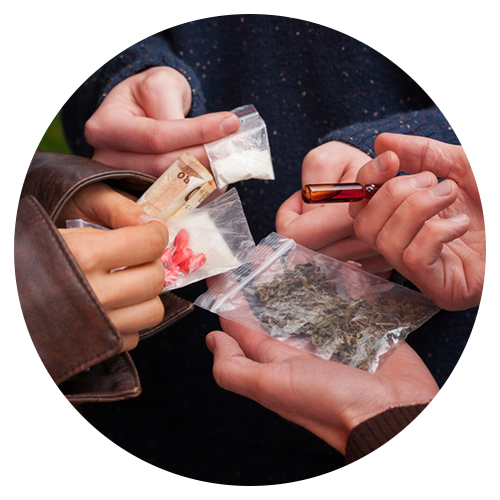Even if the state simply just tickets you for marijuana or drug possession, which includes substances derived from the cannabis plant, you need the help of an experienced Dallas drug crime lawyer. Drug crime convictions are serious, carrying with them both social stigmas and criminal penalties. At The Law Office of James Lee Bright we have over 10 years of experience defending you against drug crime allegations here in the city of Dallas and the surrounding metro area. To learn more about how we’ll defend you, contact our Dallas, Texas, law office for a free initial consultation.
Even if the police found marijuana or other drugs on you, it does not mean their case is airtight. There are hosts of procedures and protections that must be afforded to anyone arrested for a drug crime. If the police stop you illegally, conduct an improper search of your vehicle, act under an invalid search warrant, or arrest without probable cause, your case may be dismissed. The point of hiring an experienced criminal defense attorney is so that they can spot these issues and challenge them in court.
Throughout north Texas, people come to us after they have been arrested and charged with a drug crime such as:
- Possession of Marijuana or another drug
- Possession of drug paraphernalia
- Possession with intent to sell
- Drug distribution or trafficking
- Manufacturing of a controlled substance
Most successful defenses related to a drug crime involve early investigation and discovery of all the facts of a case. One of the real questions that needs to be answered early on is whether the police had a valid reason to stop and search you in the first place
If the state has accused you of committing a drug crime, you should contact The Law Office of James Lee Bright for a free initial consultation.
Understanding Marijuana Offenses in Texas
Marijuana offenses in Texas can have serious consequences, including fines, jail time, and a criminal record. Marijuana crimes in Texas can have serious consequences, including fines, jail time, and a criminal record. Understanding the laws and regulations surrounding marijuana in Texas is crucial for individuals facing marijuana-related charges. In Texas, marijuana is classified as a controlled substance, and possession, sale, or cultivation of any amount of marijuana is a crime. The penalties for marijuana possession depend on the amount found in possession, with larger amounts resulting in more severe penalties.
Types of Controlled Substance Offenses
Controlled substance offenses in Texas include possession, sale, or cultivation of various substances, including marijuana, cocaine, methamphetamine, and prescription drugs. Each type of offense carries different penalties, ranging from misdemeanors to felonies. For example, possession of less than 1 gram of cocaine is a state jail felony, while possession of 400 grams or more is a first-degree felony. Understanding the specific offense and its corresponding penalties is essential for building a strong defense.
Medical Marijuana Laws in Texas
Medical marijuana laws in Texas are limited, and only certain individuals with specific medical conditions are eligible for medical marijuana use. The Texas Compassionate Use Program allows patients with epilepsy, multiple sclerosis, and other qualifying conditions to obtain medical marijuana with a prescription from a qualified physician. However, recreational use of marijuana remains illegal in Texas, and individuals found in possession of marijuana without a valid prescription can face serious consequences.
Prescription Drug Charges
Prescription drug charges in Texas can result in severe penalties, including fines and imprisonment. Possession of prescription drugs without a valid prescription is a crime, and the penalties depend on the type and quantity of the drug. For example, possession of hydrocodone or Valium can result in a state jail felony, while possession of larger quantities can result in a first-degree felony. Understanding the specific prescription drug charge and its corresponding penalties is crucial for building a strong defense.
Cocaine and Methamphetamine Charges
Cocaine and methamphetamine charges in Texas carry severe penalties, including fines and imprisonment. Possession of these substances is a felony offense, and the penalties depend on the quantity found in possession. For example, possession of less than 1 gram of cocaine is a state jail felony, while possession of 400 grams or more is a first-degree felony. Understanding the specific charge and its corresponding penalties is essential for building a strong defense.
Sentencing and Penalties for Drug Crimes
Sentencing and penalties for drug crimes in Texas can vary depending on the specific offense, the quantity of the substance, and the individual’s prior record. Sentencing and penalties for a marijuana offense in Texas can vary depending on the specific offense, the quantity of the substance, and the individual’s prior record. In general, drug crimes in Texas are classified into different penalty groups, with more severe penalties for larger quantities and more serious offenses. Understanding the specific penalty group and its corresponding penalties is crucial for building a strong defense and negotiating a favorable plea agreement. A skilled drug crime lawyer can help individuals navigate the complex legal system and achieve the best possible outcome.
Building a Strong Defense Against Marijuana Offenses
When facing marijuana charges in Dallas, it’s essential to build a strong defense to minimize the consequences. A skilled Dallas drug crime lawyer can help you navigate the legal system and protect your rights. Here are some strategies to build a strong defense:
- Challenging the Evidence: Your lawyer can review the evidence against you and challenge its validity. This may include questioning the credibility of witnesses, highlighting inconsistencies in the prosecution’s case, and arguing that the evidence was obtained illegally.
- Questioning the Arrest: If you were arrested, your lawyer can investigate the circumstances surrounding the arrest and challenge its legality. This may include arguing that the police did not have probable cause to arrest you or that your rights were violated during the arrest.
- Highlighting Mitigating Circumstances: Your lawyer can present evidence of mitigating circumstances that may have contributed to your possession of marijuana. This may include evidence of medical necessity, lack of knowledge about the substance, or coercion by others.
By employing these strategies, a Dallas drug crime lawyer can help you build a robust defense against marijuana charges, ensuring your rights are protected throughout the legal process.
Federal and State Laws Regarding Marijuana
Marijuana is still a controlled substance under federal law, but some states have legalized its use for medical or recreational purposes. In Texas, marijuana is still illegal, but there are some exceptions. Here are some key federal and state laws regarding marijuana:
- Federal Law: The Controlled Substances Act classifies marijuana as a Schedule I substance, which means it has a high potential for abuse and no accepted medical use.
- Texas Law: The Texas Controlled Substances Act prohibits the possession, sale, and distribution of marijuana. However, there are some exceptions for medical use, such as the Compassionate Use Program, which allows patients with certain medical conditions to use low-THC cannabis oil.
Understanding these laws is crucial for anyone facing marijuana charges in Texas, as they dictate the legal landscape and potential penalties.






